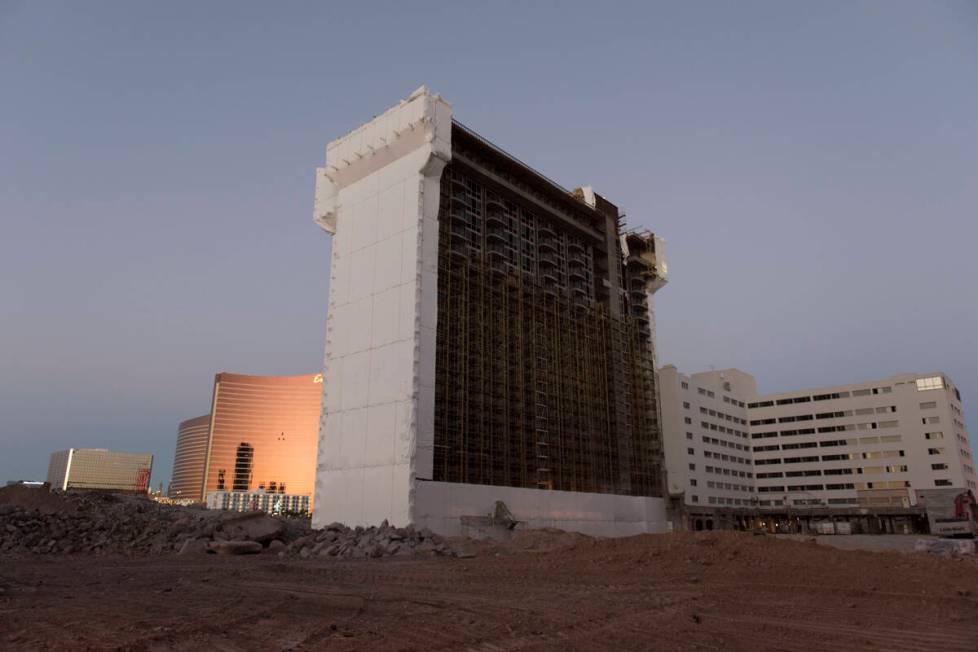Chilean developer cancels $120M deal to build Strip hotel-casino

The Chilean billionaire who planned to acquire 10 acres where the Riviera once stood has backed out of the $120 million deal with the Las Vegas Convention and Visitors Authority.
Claudio Fischer, a former commercial airline pilot who developed the Monticello casino resort near Santiago, Chile, and the Park Hyatt Mendoza hotel-casino in Argentina and has real estate holdings in Panama, owns two airlines and the resort development company Sun Dreams.
“The land sale to developer Claudio Fischer did not close on Dec. 15,” LVCVA President and CEO Steve Hill said in an emailed statement. “As a result, the LVCVA terminated the agreement, received the $7 million nonrefundable deposit, and relisted the property.”
An LVCVA spokeswoman said the loss of the deal would not impact its schedule for a two-year $600 million renovation project on the Las Vegas Convention Center’s North, Central and South halls, which is due to start at the end of March.
Hill had told the LVCVA board of directors in November that the proceeds from the sale would be used to help finance the renovation. Details of the failed transaction and its effects are expected to be discussed at the LVCVA’s Jan. 10 board of directors meeting.
Deal won’t pencil out
The deal’s collapse was first reported Monday by the Spanish-language website SBCNoticias.
In that report, Fischer said rising interest rates in the United States no longer allowed his planned resort at Las Vegas and Elvis Presley boulevards, across from Resorts World Las Vegas and the Fontainebleau construction site, to pencil out financially.
SBCNoticias reported Fischer was discouraged by the Federal Reserve implementing seven consecutive rate hikes last year. Most recently, the central bank raised its benchmark interest rate by a half percentage point last month, to a target range between 4.25 percent and 4.5 percent.
Fischer had a dream to build and operate a casino in Las Vegas since his father took him to Circus Circus when he was 4. The story indicated Fischer has not given up on trying to develop a resort in Las Vegas, and he hopes to re-initiate a future deal.
Fischer said he planned a 50-story, 2,000-room hotel, with a casino hosting some 2,000 slot machines — the first time any plans for the property were publicly disclosed. It would have been one of the closest hotel properties to the Convention Center’s new West Hall.
Under terms of the deal, the LVCVA would have continued to have access to the land for parking and any outdoor convention exhibits, and Fischer wouldn’t have to start construction on a resort until Jan. 1, 2031, after which the LVCVA would have the option to buy back the land.
‘Curious innovator’
Hill has always spoken highly of Fischer.
In interviews in 2020, when the deal was first announced, Hill called Fischer “a curious innovator always looking for the next way to take care of his customers and employees.” He said Fischer would be a good neighbor for the Convention Center, a good fit for Las Vegas and is known among Southern Nevada casino executives.
In early 2020, Hill and LVCVA Chief Financial Officer Ed Finger flew to Santiago, Chile, to meet with Fischer and negotiate the $120 million deal to buy the land where the Riviera once stood.
But in March 2020, COVID-19 stung Southern Nevada’s economy, closing casinos for an unprecedented 78 days. When that happened, Hill and the LVCVA had more to worry about than selling real estate, and both parties agreed to put everything on hold.
The LVCVA originally acquired the land because it was needed to complete the $1 billion development of the West Hall. The group needed a portion of the land for a parking lot and to shift the footprint of the building west to make incoming deliveries easier on the east side. The LVCVA had planned to sell the 10 acres of Strip-front land for potential resort development and to have a funding source for its renovation project.
Nine months after COVID-19 began beating up on the world, Fischer was back on the phone with Hill to restart the land deal. Another 10 months later, in October 2021, Hill presented a proposal to the LVCVA board of directors to sell the land for the agreed-upon $120 million.
Because the LVCVA originally acquired the Riviera with tax-free bonds, it needed to reinvest the proceeds of the sale to a project also financed by bonds — the renovation. Also, the Boring Co. began making deals with Strip resorts to build its underground Vegas Loop transit system, and some of the planned tunnels were close to Fischer’s future project.
The closing of the sale to Fischer needed to occur after June 30, and, after several communications among Fischer, Finger and LVCVA General Counsel Caroline Bateman, the land deal was nearing completion.
Hill told the LVCVA board of directors in November that he expected the deal to reach the finish line by Nov. 30, although Fischer had until Dec. 15 to close the transaction.
Contact Richard N. Velotta at rvelotta@reviewjournal.com or 702-477-3893. Follow @RickVelotta on Twitter.